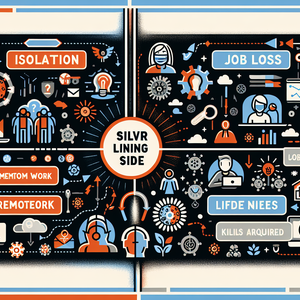The Rise of Remote Work and Its Impact on America's Most Popular Jobs

The onset of the pandemic necessitated a swift transition to remote work, prompting nearly 42% of the U.S. labor force to work from home full-time, according to a Stanford University report. This abrupt shift forced businesses to rethink operations and adopt new technologies—Zoom and Slack became household names almost overnight. As companies began to recognize the viability of remote work, many chose to retain this model, leading to a fundamental reevaluation of job roles and their requirements. The shift has been particularly advantageous for sectors reliant on digital interactions while proving challenging for industries anchored in physical presence. For instance, technology, customer service, and digital marketing jobs have seen substantial growth in demand, while retail and hospitality sectors have struggled to retain their workforce.
Thriving Remote Jobs
1. Tech and IT Roles: The technology sector has experienced a renaissance as remote work has become the norm. Positions like software developers, cybersecurity analysts, and data scientists are thriving. A LinkedIn report indicated that remote job postings for software development roles surged by 200% between 2020 and 2021. Companies are capitalizing on a global talent pool, leading to enhanced productivity, innovation, and employee satisfaction. For instance, tech giants like Microsoft and Twitter have adopted permanent remote work policies, signaling to the industry that remote work is here to stay. 2. Customer Service Representatives: The demand for remote customer service representatives has skyrocketed as businesses pivot to online platforms. Companies such as Amazon and Zocdoc have expanded their remote support teams, ensuring that customer service remains robust while accommodating a growing online customer base. These roles facilitate essential connections between companies and their customers, enabling businesses to thrive in a digital-first world. 3. Marketing and Content Creation: The digital marketing landscape has evolved significantly, with roles in social media management, content creation, and SEO analysis gaining prominence. As businesses increasingly rely on remote professionals to enhance their online presence, collaboration across different time zones fosters creativity and innovation. For instance, companies are now employing remote teams to strategize and execute marketing campaigns, resulting in a more dynamic and effective approach to audience engagement.
Fading Traditional Roles
1. Retail Positions: The retail sector has been one of the hardest hit by the rise of remote work and the acceleration of e-commerce. Traditional jobs such as cashiers and sales associates have declined sharply, as more consumers opt for online shopping. According to the U.S. Bureau of Labor Statistics, retail employment fell by 1.9 million jobs in 2020 alone, with many positions unlikely to return as businesses adapt to new consumer behaviors. 2. Hospitality Jobs: Similarly, the hospitality industry has faced significant challenges, with roles in hotels and restaurants experiencing a downturn. Many establishments have pivoted to hybrid models, focusing on takeout and delivery services rather than traditional dine-in experiences. This transition has resulted in fewer job opportunities in traditional hospitality roles, forcing many workers to reevaluate their career trajectories and seek opportunities elsewhere.
The rise of remote work has drastically reshaped America's job landscape, ushering in new opportunities while phasing out traditional roles that once thrived in a pre-pandemic world. As businesses adapt to this evolving environment, it is essential for job seekers and employees to remain flexible and open to change. Understanding which positions are flourishing and which are fading can empower individuals to navigate their career paths effectively in this new work paradigm. The future of work may be predominantly remote, but it holds significant potential for those willing to adapt and embrace the change. With the right mindset and skills, workers can thrive in an increasingly digital and flexible workforce.
Remote Software Developer (Full Stack)
Tech companies like Google, Amazon, and startups in the SaaS space
Job Description
Design, develop, and maintain web applications using modern frameworks and technologies (e.g., React, Node.js).
Collaborate with cross-functional teams to gather requirements, architect solutions, and implement features effectively.
Required skills include proficiency in JavaScript, HTML/CSS, and experience with version control systems like Git.
Cybersecurity Analyst (Remote)
Financial institutions, healthcare companies, and cybersecurity firms like CrowdStrike and Palo Alto Networks
Job Description
Monitor and analyze security threats and incidents, implementing measures to safeguard company data.
Conduct vulnerability assessments and penetration testing to identify weaknesses in systems.
Strong knowledge of security technologies such as firewalls, intrusion detection systems, and encryption methods is essential.
SEO Specialist (Remote)
Digital marketing agencies, e-commerce companies, and brands focusing on online visibility
Job Description
Develop and implement SEO strategies to improve organic search rankings and increase website traffic.
Conduct keyword research, analyze website performance, and utilize tools such as Google Analytics and SEMrush for data-driven decisions.
Must possess strong analytical skills and knowledge of on-page and off-page optimization techniques.
Customer Experience Manager (Remote)
E-commerce platforms, service-oriented businesses, and tech companies focusing on customer engagement
Job Description
Oversee the development and implementation of customer service strategies to enhance satisfaction and loyalty.
Analyze customer feedback and performance metrics to identify areas for improvement in service delivery.
Requires strong communication skills, experience with CRM tools (e.g., Salesforce), and a background in customer service.
Content Marketing Strategist (Remote)
Marketing agencies, media companies, and brands with strong online presences like HubSpot and Buffer
Job Description
Create and manage content marketing strategies aimed at increasing brand awareness and driving traffic.
Collaborate with writers, designers, and other stakeholders to produce high-quality content across various platforms.
Proficiency in digital marketing tools and understanding of content analytics to assess performance is crucial.


